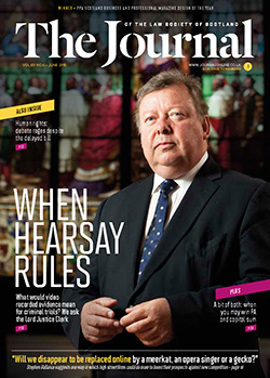The word on the street

I am privileged to be part of HM Connect, the support and referral network run by Harper Macleod, and through it have visited some of our 270 or so member firms throughout Scotland
Over the past year I have noted a number of striking features which have served to remind me of the importance of our high street firms, their role in their local community and the quality of the service they so often offer. Some you may already be aware of; others may need to be pointed out.
Let me start with a short tale. An old friend, a taxi driver, advised me many years ago that taxi drivers were the best early indicators of economic conditions. If they were busy, the economy was good, but if people did not have £5 or £10 to spend on a Saturday night to bring them home, that was a sure sign that times were tough. He, you will be delighted to know, is currently busy.
Sleeping Beauty awakes
I think the same can be said for legal firms. Our success or failure is, by and large, a reflection of our local economies. While a few have carved out niche practices or built national businesses, generally you can tell how well an area is doing by how busy the receptionist is in the local solicitors. One practitioner whom I questioned recently advised: “The thaw hasn’t reached Dumbarton yet.” As I’ve travelled across Scotland I have been mindful to check where the thaw has and hasn’t reached.
The answer, as you probably know, is that the thaw has now reached most places. The housing market is steadying and, more importantly, volumes are increasing. Closing dates are returning, and in the traditionally busier areas such as the West End of Glasgow there is again competition and some price inflation. Other areas of practice are also undoubtedly improving – some directly or indirectly related to housing. Family law, asset protection, commercial property, to name but a few, all do well as economic conditions improve.
The last seven years since I sold my own legal practice have been the toughest that most of us can remember. What I see now, though, is that during that period our clients did not leave us, they were just economically inactive. The legal world on the high street did not radically change. Tesco law, commoditisation or any of the other threats so often talked about were not the reason for the plummeting profits of private practice. Simply, everything went into hibernation including, apparently, ABS despite the furore around its inception.
A little like Sleeping Beauty, our clients and firms just went to sleep and are now awakening from the nightmares of excessive lending and bank collapses to a world far more like that of the late 1990s, before it all started spinning out of control. One consultant uttered recently: “Where a few years ago I saw nothing but despair and despondency, I now see optimism and hope.”
I have been delighted to meet firms that during the leaner years really tackled the issues surrounding their business. A few sought out areas of law unaffected by recession; others capitalised on opportunities that arose or readdressed the way they communicated with their clients and the world. For them, especially, the future is looking increasingly bright. They have shown that even in the toughest of times, if you maintain a clear focus you can make progress.
Excellence of service
Why else have our local solicitors survived and are beginning to thrive again? Well, from many that I have visited, it is down to one simple thing: excellence of service. We generally do an exceptional job, often above and beyond what is technically required. We want to do it right and are passionate about looking after our clients.
I think that is why so many smaller firms struggle with the regulation that appears to some extent to be foisted on them from above. Clients’ welfare and best interests have always been at the core of their practices, and the more rigid structures that formal regulation brings have at times detracted from, rather than improved, the level of care that they wish to provide. It is seen almost as an additional tax, another unpaid-for burden.
Cynics may say that this excellence of service is driven either by fear or by greed: fear of regulatory issues or greed by way of financial gain. I disagree. In our local communities solicitors still know their clients, their families and their businesses and have a personal desire to do a good job. My experience is that firms give away many unbilled hours, often feeling that they can’t charge clients and instead bear the burden themselves.
I regularly hear stories about how and why solicitors go that extra mile. They have real connections with their clients. They know them, and in so many cases know their circumstances and act accordingly. Meetings out of office and out of hours, home visits and unbilled time are common in almost every area of law. They are able to give best advice because, more than any “Know your client” form, they actually know their clients and the communities in which they operate. This, more than anything, is what has made our high street firms successful.
If I have one observation to make, though, it is this: some solicitors don’t realise the impact they have on their clients. For them it may be just another day in the office. To clients, though, their solicitor can be a little like a leading actor on a stage. A timely example came during a recent trip to Gleneagles. Pulling up to the front door in my very modest car, a gentleman greeted me with “Hello Stephen, welcome to Gleneagles.” I was amazed. I asked, “Do you have a system that recognises car number plates?” “No,” he told me, ”you are my lawyer.” On the basis that I have not practised at the sharp end for almost seven years, that was a real insight into how our clients see us and the impact we must have on them.
While there is no doubt that high levels of service have a benefit by way of client retention, practitioners at times forget to explain to their clients just how much they have done for them. We are not, in general, great at self promotion. Occasionally we put a little meaningless blurb at the bottom of a fee note saying “modified to”. Does a client really understand that? How much more benefit could we obtain by explaining to clients where we have gone the extra mile? Perhaps more importantly, do we obtain client testimonials about our excellence of service that we can publish? Do we tell them that we are always seeking referrals? Do we remind them of all of the other services that we can offer, or that we are happy to recommend other trusted advisers where we can’t assist?
A taste of things to come
I remember reading an article about why so many new chocolate bars are launched. In essence, people will try them once and if they like them will continue to buy them. The cost of acquiring new clients is relatively cheap and the risk to the purchaser is small. If they don’t like the new product they will return to their original bar tomorrow.
Will our loyal clients take the risk of trying different or substitute products? The challenge for us is that, if so, the buying cycle is often measured in years, not days. When our clients return next time unsatisfied by the “inferior” product, will we still be there? I remember attending a talk where the speaker advised that unhappy clients might not return, happy clients might return, and it was only those clients to whom we had provided an exceptional service that were guaranteed to return.
There is no doubt that as the economy awakens and technology makes an ever greater impact, the pull on clients to try cheaper or substitute products will increase. Can we as a profession address these issues and, like some of our firms, increase our businesses against this tide? Or, like the late lamented general insurance broker, will we disappear to be replaced online by a meerkat, an opera singer or a gecko?
Part of the fabric
On my travels I have come to realise that more than just being an economic indicator, many practices are repositories of so much local history (Stephen Vallance writes). I can think of few businesses that will have existed within their local communities for so long, with such meticulous records servicing generations of the same families. Some proudly display pictures predating their current partners showing their town as it used to be (a few unfortunately have wallpaper and carpets of a similar age).
High street firms contain within their walls and safes priceless material about the local area and its inhabitants. There is a huge untapped resource of knowledge that few either within or outwith the profession appear to appreciate. A little like recording the memories of elderly grandparents, I do wonder if, having properly addressed confidentiality issues, this is not something to be ingathered and recorded now, rather than risk it being lost as a result of an “untimely passing”.
In this issue
- Weighing the risks
- Private parking fines – are they enforceable?
- Scotland – home of (dangerous) golf
- Shareholder details: the right to refuse
- Perils of the owner-occupied croft (fuller version)
- Reading for pleasure
- Opinion: Thomas Ross
- Book reviews
- Profile
- President's column
- Land Register completion: one year in
- People on the move
- Rights: whose final say?
- The word on the street
- Screen test
- Making the best of mediation
- Keep up the payments
- The right priorities
- When reputation is not enough…
- Sports justice – being seen to be done?
- Source of disputes
- CML Handbook: the new deal
- Perils of the owner-occupied croft
- In-house and in-tune in the Commonwealth
- Stair Society seeks new blood
- New Build Standard Clauses revised
- Law reform roundup
- Leven's last hole rarely in benevolent mood
- Year of the new look
- AML just became simpler
- "My time is valuable!" Oh really?
- Learning opportunity
- Ask Ash
- Technology: slave or master?






